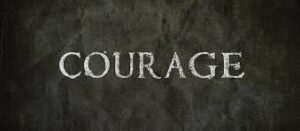 My generation was weaned on John F. Kennedy’s Profiles in Courage. I can’t remember, without looking, just who the future president wrote about, but in that less partisan time, and rooted in his experience as a young officer in World War II, the gateway for inclusion was certainly not political.
My generation was weaned on John F. Kennedy’s Profiles in Courage. I can’t remember, without looking, just who the future president wrote about, but in that less partisan time, and rooted in his experience as a young officer in World War II, the gateway for inclusion was certainly not political.
Today, most educators believe that we can and should influence the character development of our students, and in fact many schools include character and values in their mission statements. Often these traits for which we hope to educate include things like resilience, risk-taking, and grit. Certainly, those involve the trait of courage.
It is often cited that heroes are not those lacking fear; they are the ones who experience fear and overcome it. That must be one definition of courage.
I must write this apolitical footnote regarding courage on the occasion of the trial and acquittal of former president Trump. This is not a political argument; in fact, it has nothing to do with the former president’s actions nor with the election around which they have percolated. It is very specifically a comment on courage.
The Democrats in both the House and Senate who voted, respectively, to impeach and convict the former president did not show courage. Their votes were comfortable. They may have been right or wrong in your opinion or in mine, but it did not take courage to cast these votes. Similarly, it did not take courage for Republicans to vote to oppose impeachment or for acquittal. Taking a safe, expected action, with little or no risk, whether that action be viewed as right or wrong, is not a demonstration of courage.
In contrast, the Republicans who cast their votes against the interests of the former president did, in fact, show a great deal of courage. They put their sense of what is best for the future of the country ahead of their own political interests, and in some cases, where they or their families have been threatened, their own safety. This is the very definition of courage. Whether or not I agree with their politics or policies is irrelevant. But if a next edition of Profiles in Courage were to be written, these civic servants in this particular moment deserve to be included.
Following the vote to acquit, Senator Mitch McConnell took to the floor to explain his vote to acquit. I believe that Sen. McConnell will go down in history BOTH as one of the most skilled and powerful leaders in the history of the U.S. Senate, AND has one of the most controversial for many reasons, not the least of which was rejecting confirmation hearings for President Obama’s supreme court nominee while fast-tracking that of President Trump’s. Regardless, I believe Sen. McConnell deeply values the history and traditions of the Senate.
Sen. McConnell excoriated the former president in his floor speech; he repeated virtually every argument made by the House Democrats in favor of conviction. He then explained his vote to acquit by saying that the impeachment was unconstitutional; here is where, in my opinion, he showed an utter LACK of courage. He first stridently condemned the former president for failing to concede an election he had lost. McConnell then used the constitution argument, DESPITE the fact that just days earlier, the question of constitutionality had been asked and answered by a vote of the Senate. In other words, McConnell refused to accept the results of a vote that he did not like, just as the former president had, in order to justify his response. He finished by saying that others could prosecute the former president for the very actions that he, Sen. McConnell, had condemned him for just moments before.
If I were teaching high school social studies, civics, rhetoric, or debate, I would use this as a case study of courage; an extraordinarily relevant and historically significant example of those who act in the face of personal and professional danger, and those who look for a loophole, or ask others to act on their behalf. Just as we study the events of the civil rights movement today, as we contrast those who demonstrated great courage and those who hid behind prevailing covers of prejudice, this case will be studied in the future.
Others might well view this differently, which makes it a good opportunity for research, introspection, and discussion. It will also be a good exercise in critical thinking: keeping the focus on “courage”, which we can agree on, not on politics or personalities. Hopefully in this time of unprecedented divisiveness, learning that courage is not defined by party or label might help our students to practice the values we wish for them.











Leave A Comment